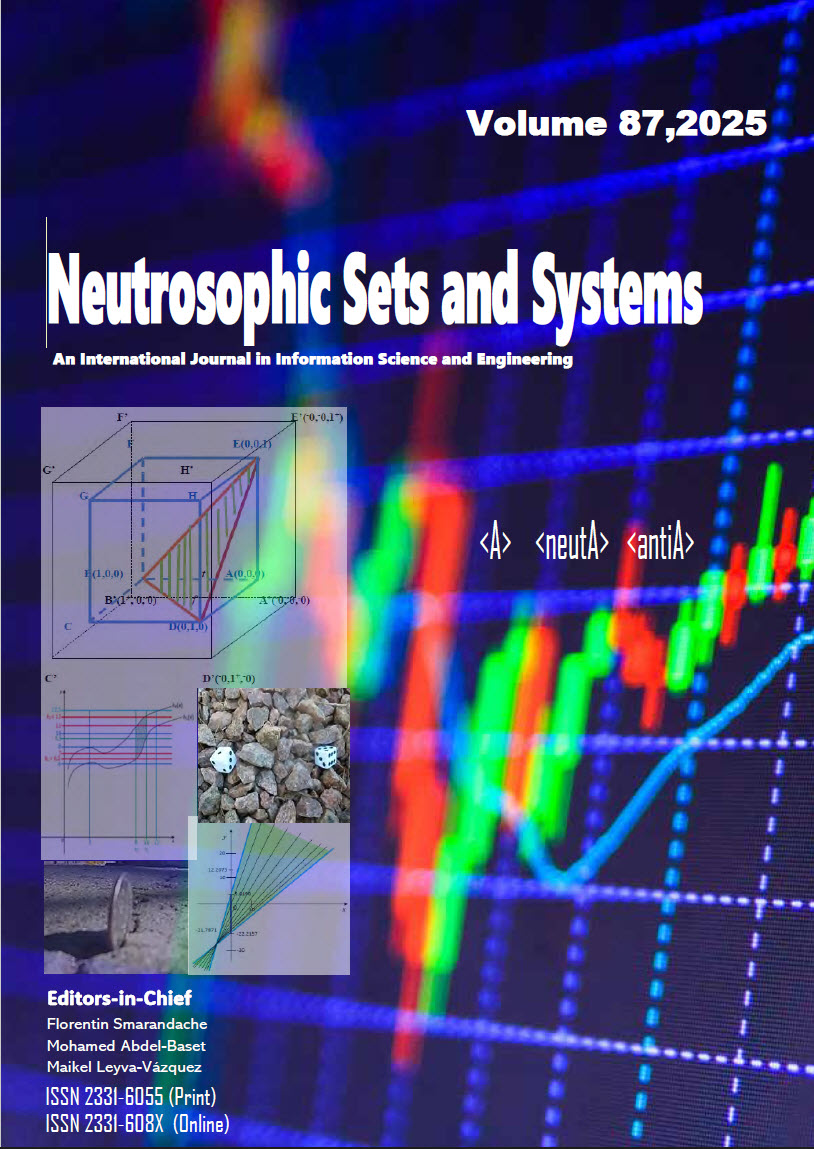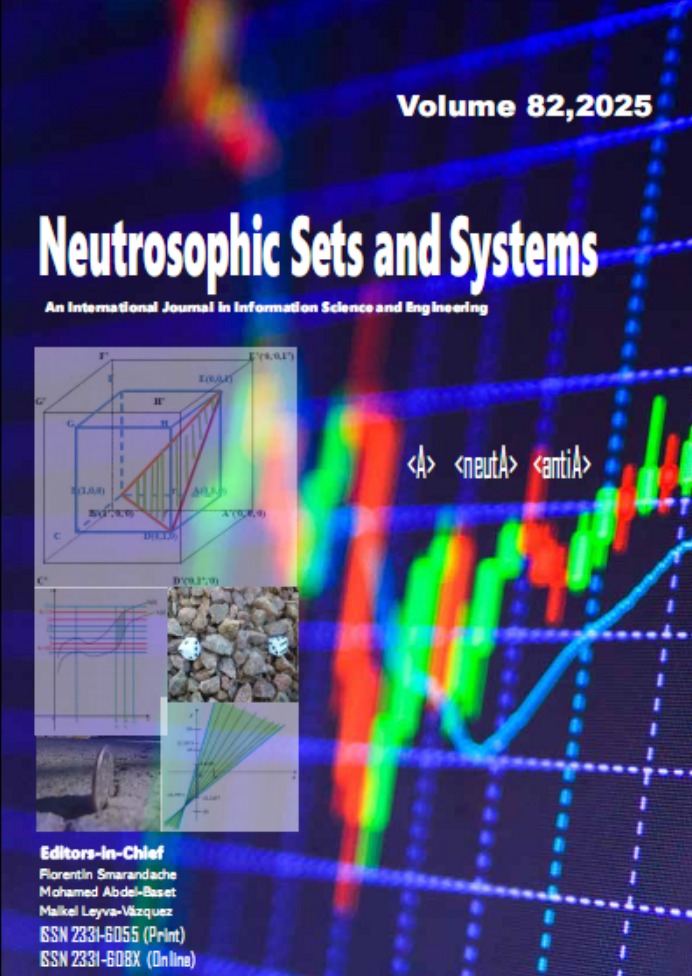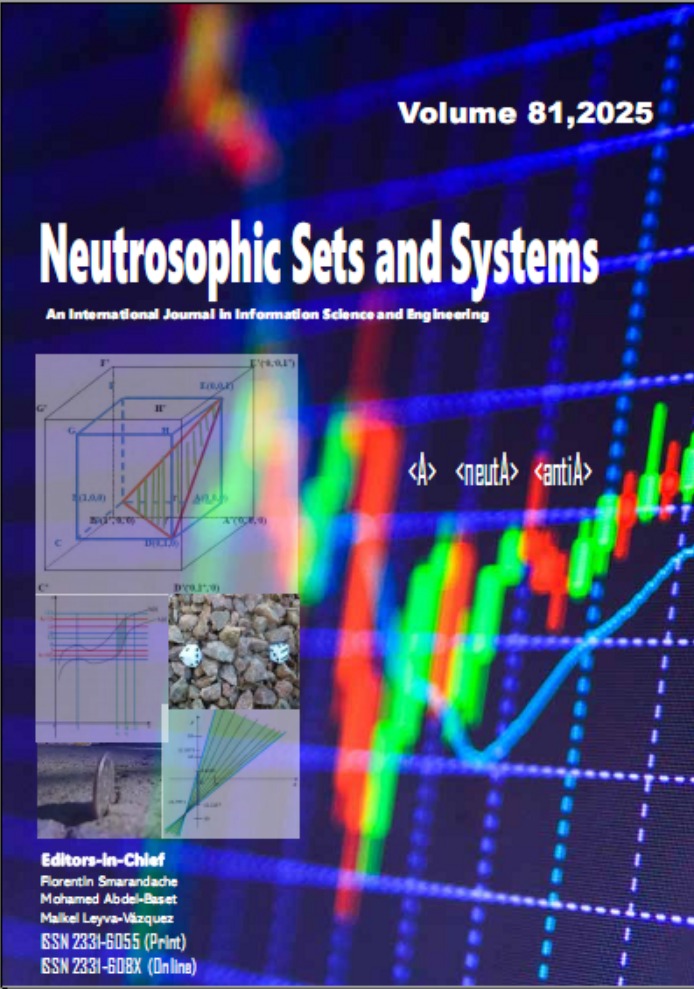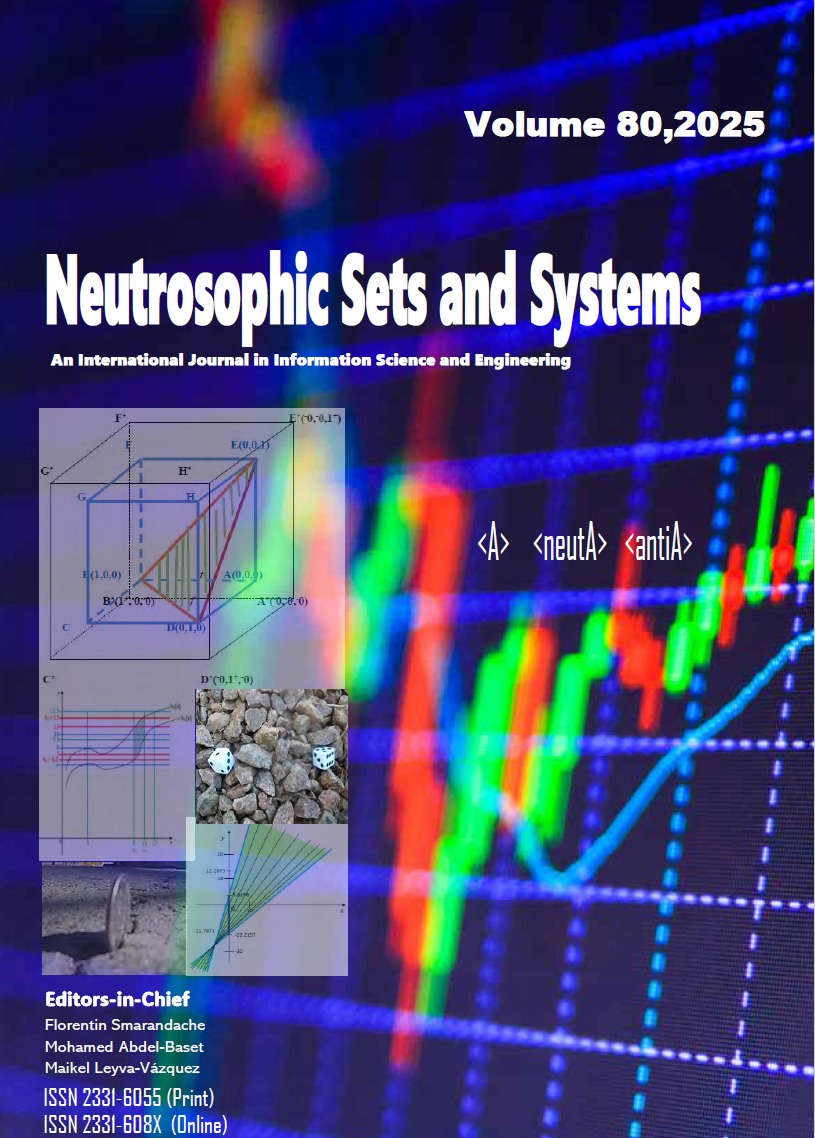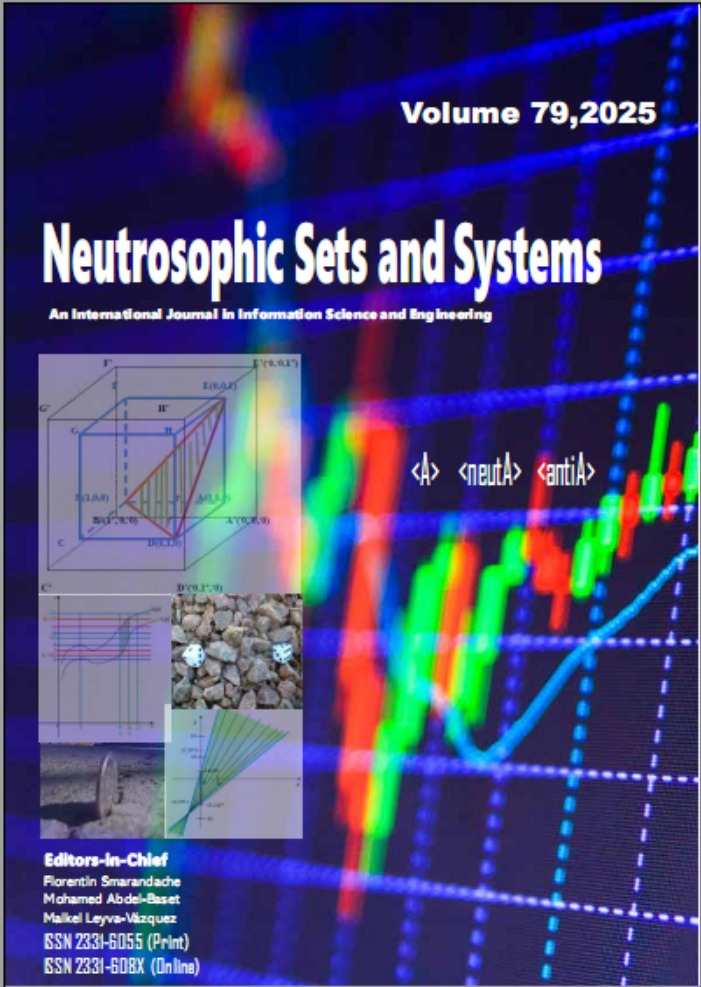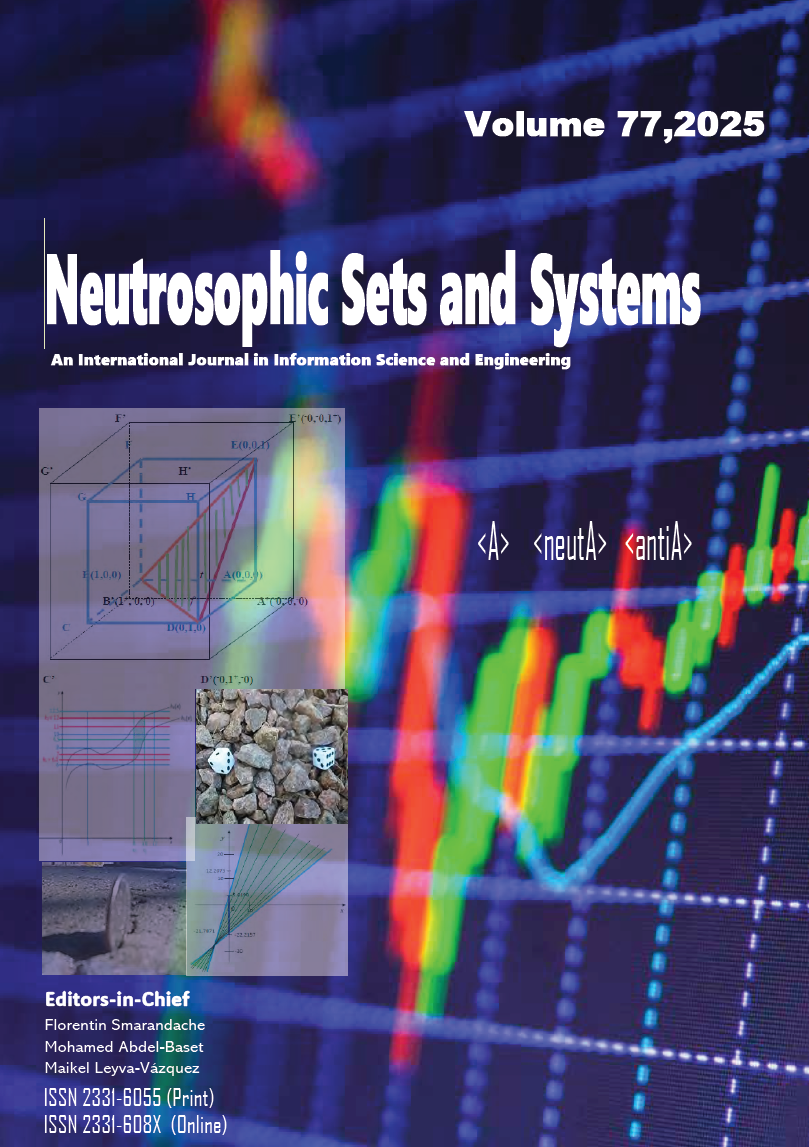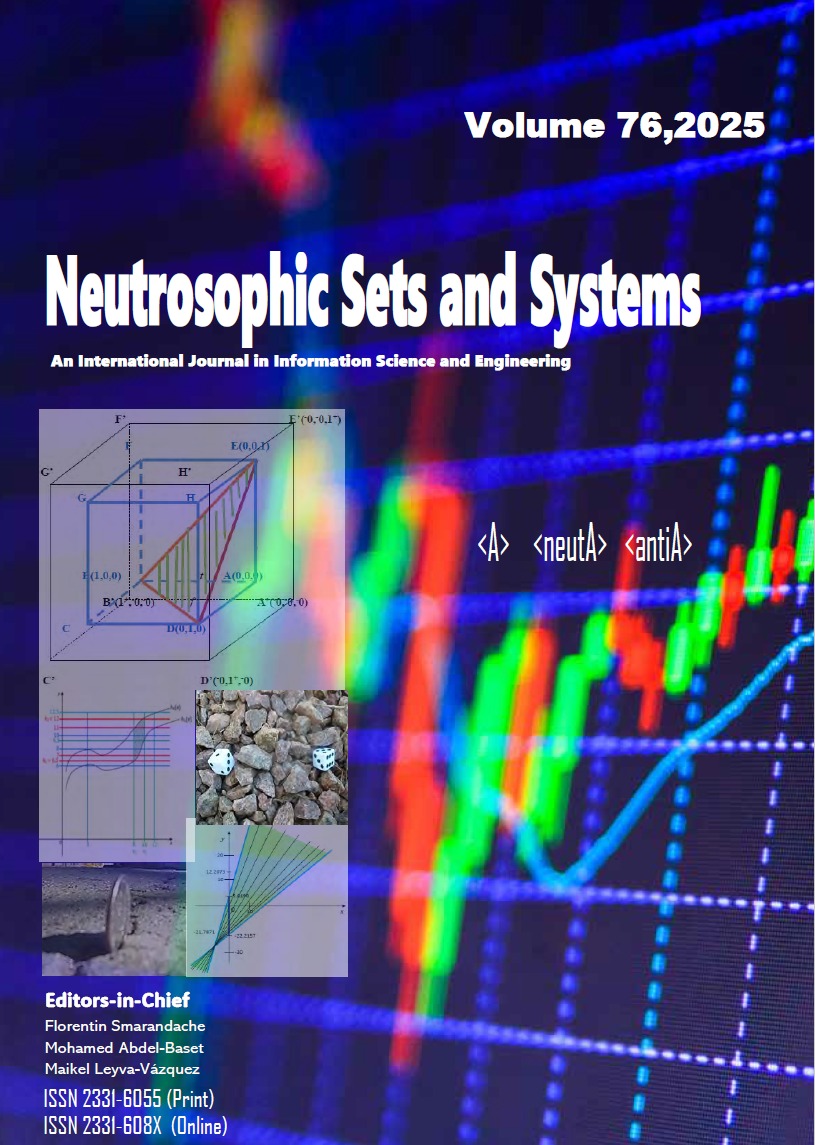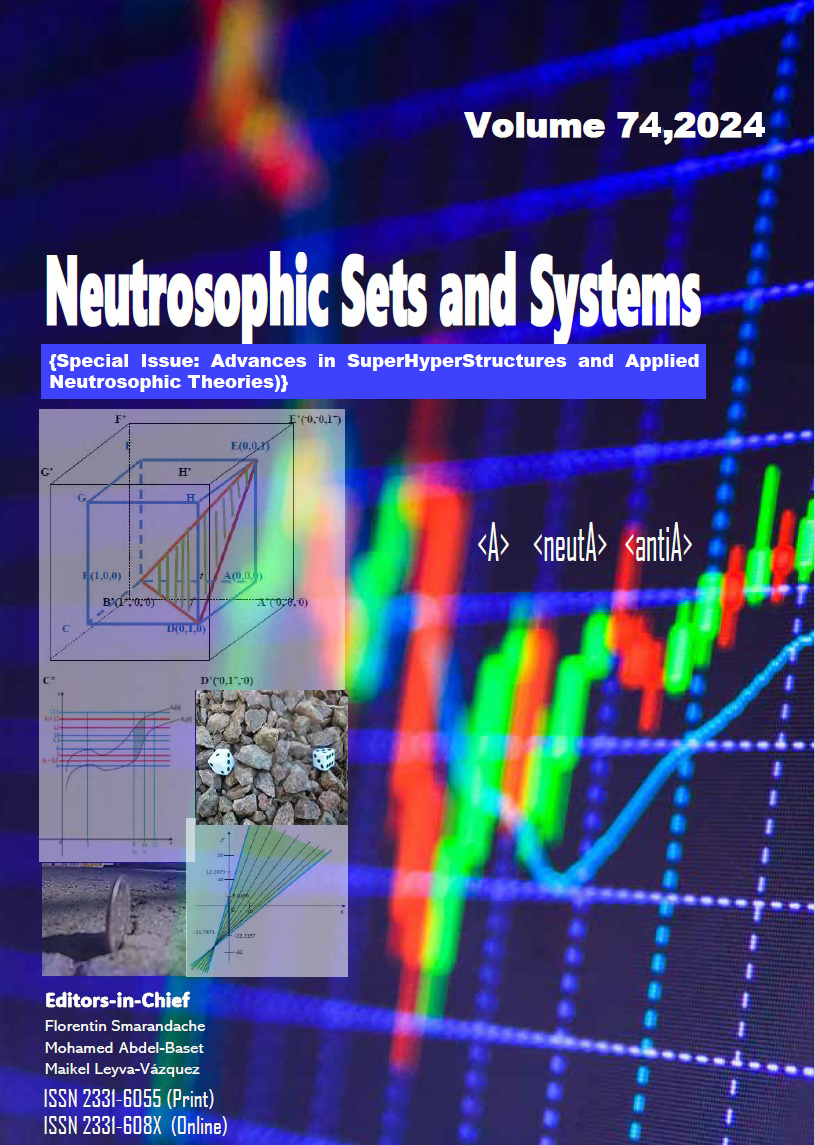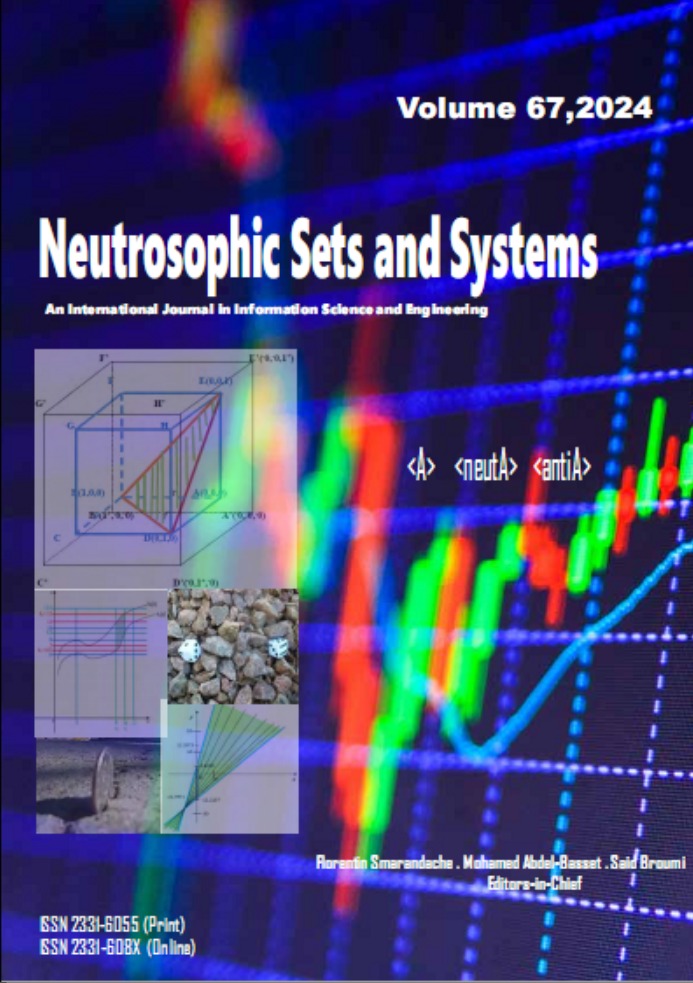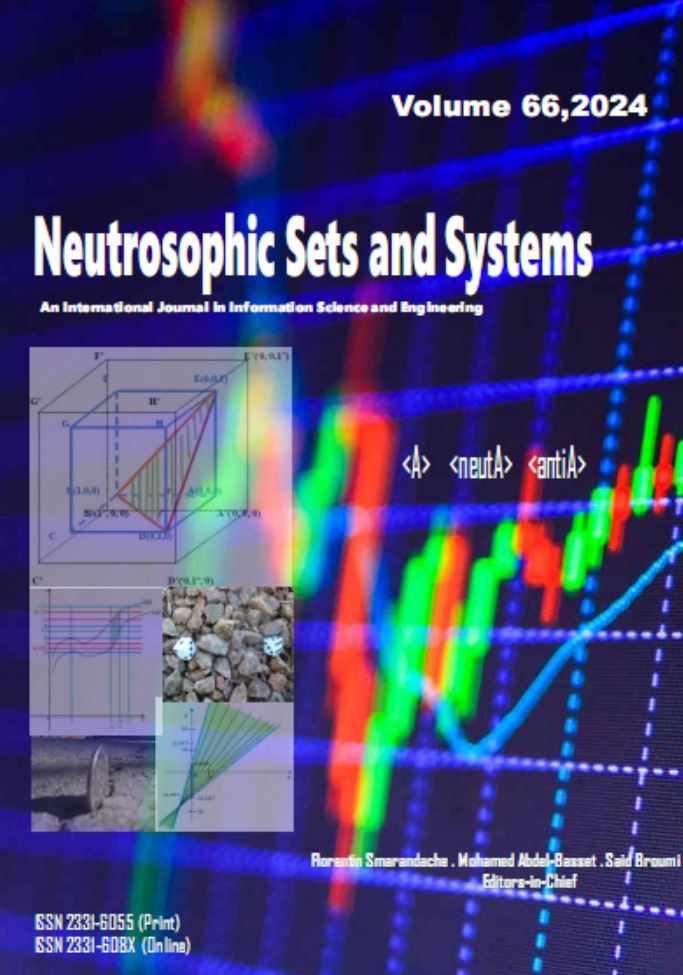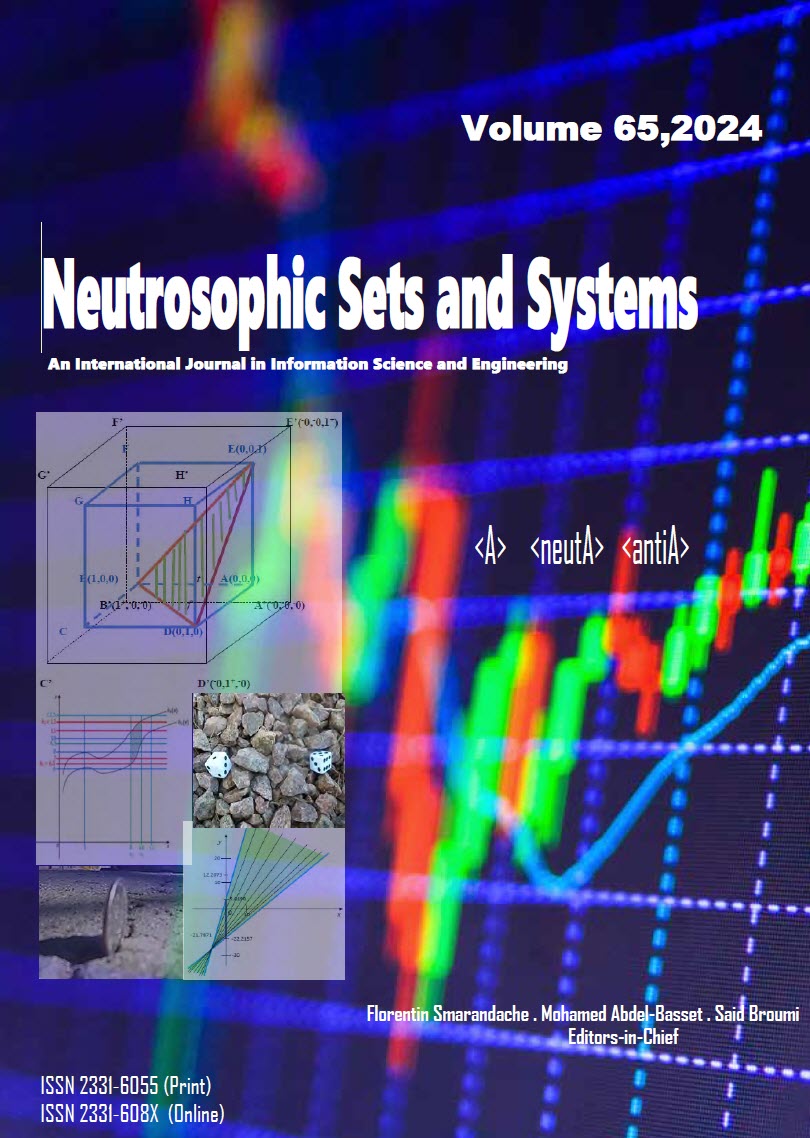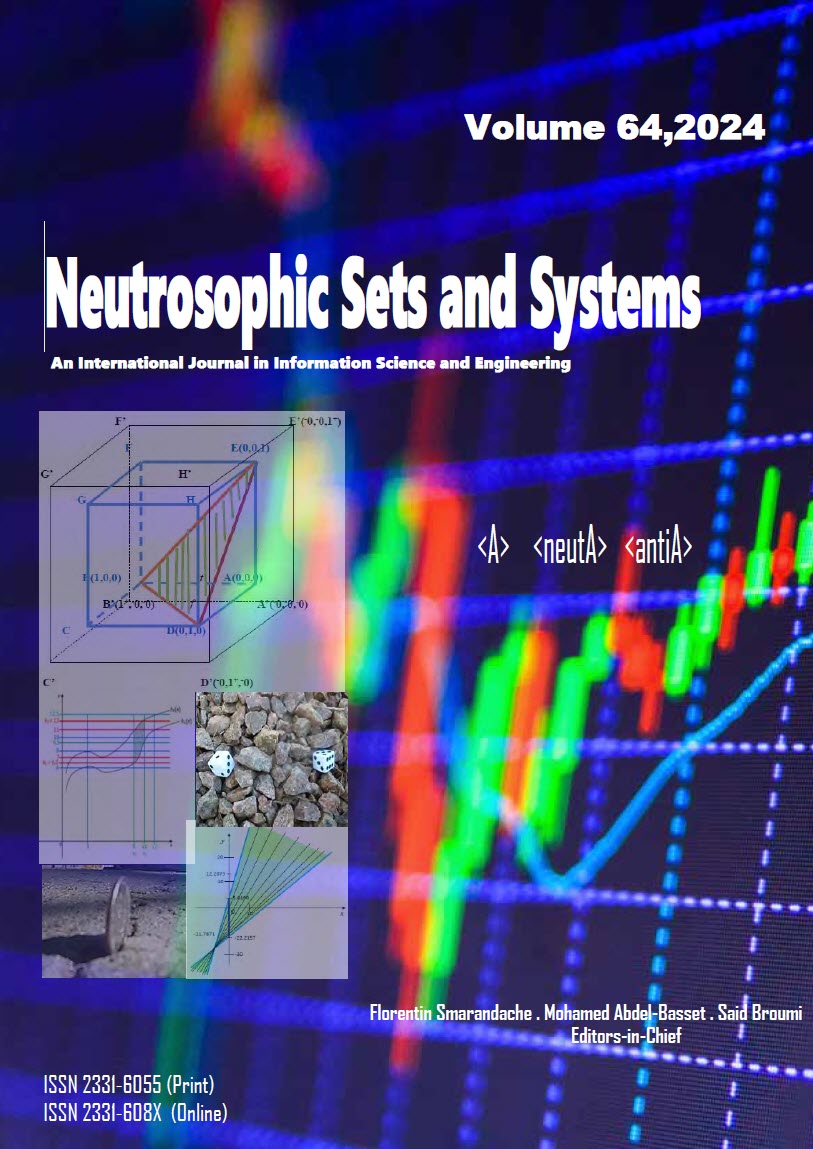Archives
-
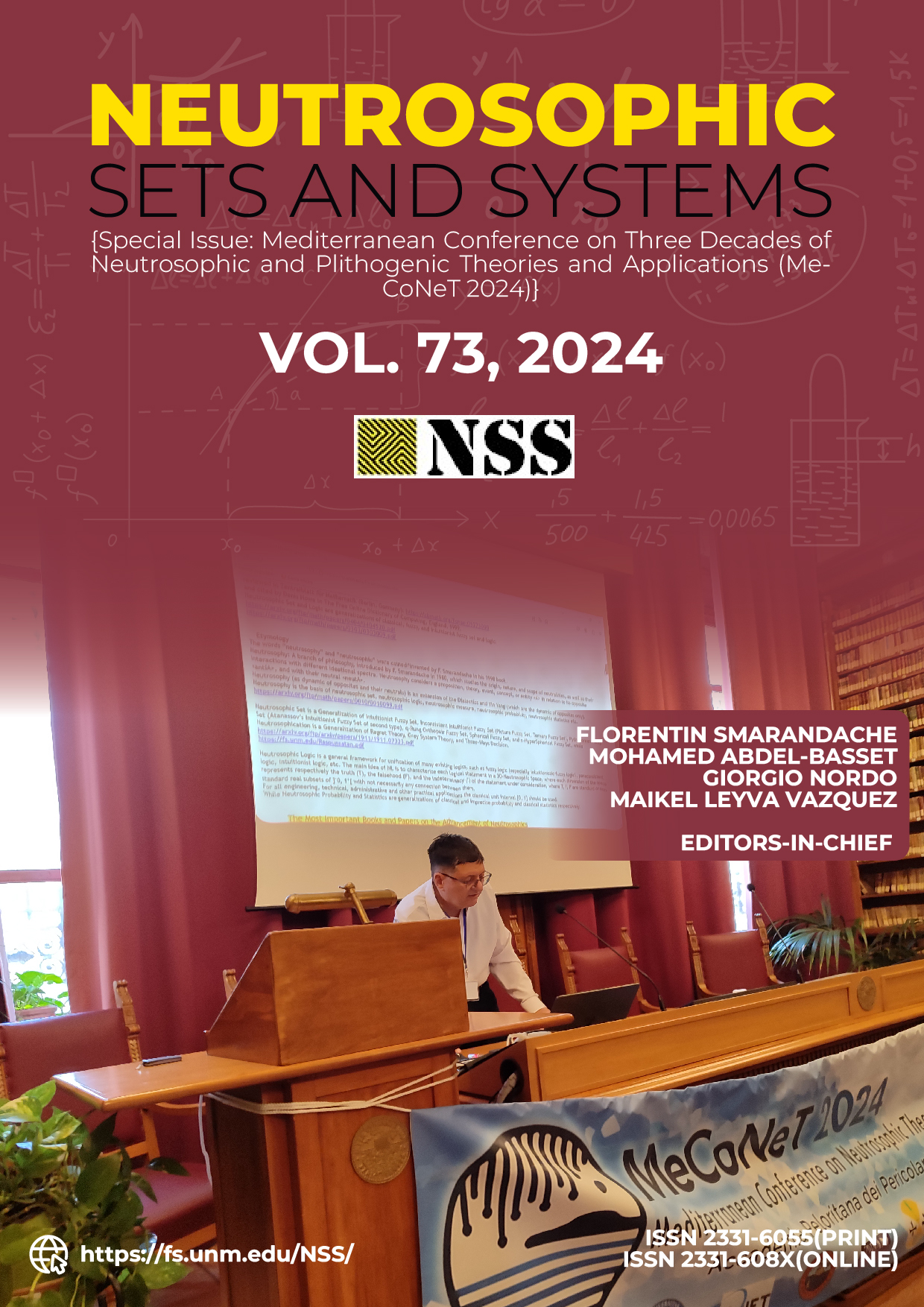
Neutrosophic Sets and Systems {Special Issue: Mediterranean Conference on Three Decades of Neutrosophic and Plithogenic Theories and Applications (MeCoNeT 2024)}, Vol. 73, 2024
Vol. 73 (2024)Preface
This volume contains the proceedings of the Mediterranean Conference on Neutrosophic Theory (MeCoNeT 2024), held at the Accademia Peloritana dei Pericolanti of the University of Messina on September 24-25, 2024. The event was organized by the MIFT Department (Mathematics, Computer Science, Physics, and Earth Sciences) of the University of Messina, marking the first international congress on neutrosophic theories outside the Americas. This milestone has firmly established the Mediterranean region as a key hub for research in the rapidly growing field of neutrosophic theory.
Neutrosophic theory, first introduced by Professor Florentin Smarandache in the mid-1990s, extends classical and fuzzy logic by incorporating the concept of indeterminacy. Its innovative approach offers precise mathematical tools to model uncertainty, contradiction, and incomplete information. With applications spanning artificial intelligence, decision-making, data analysis, economics, and biology, neutrosophic theory continues to find increasing relevance in various scientific fields.
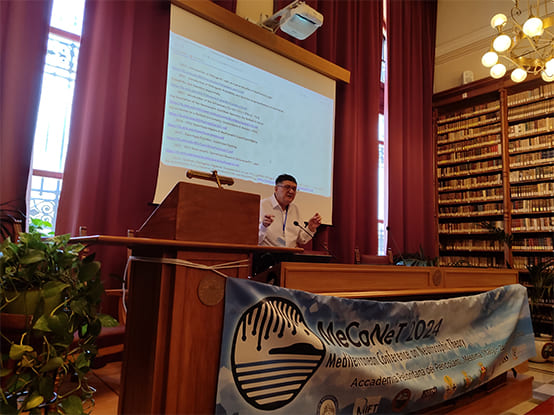
The MeCoNeT 2024 conference drew over 100 participants from more than 15 countries, with more than 50 scientific contributions selected through a rigorous peer review process. The hybrid format of the event—featuring in-person sessions at the historical Accademia Peloritana dei Pericolanti and online parallel sessions—allowed for broad international participation. The conference thus offered an ideal platform for sharing interdisciplinary research and addressing contemporary challenges in mathematics and beyond.

We were privileged to welcome a distinguished lineup of keynote speakers, who shared their expertise on the latest advancements in neutrosophic theory and its applications. These speakers included Prof. Farkhanda Afzal (National University of Sciences and Technology, Pakistan), Prof. Bhimraj Basumatary (Bodoland University, India), Prof. Said Broumi (Hassan II University, Morocco), Prof. Paulraj Gnanachandra (Ayya Nadar Janaki Ammal College, India), Prof. Saeid Jafari (Mathematical and Physical Science Foundation, Denmark), Prof. Hovik Matevossian (Russian Academy of Sciences, Moscow), Prof. Giovanni Molica Bisci (University of Urbino, Italy), and Prof. Florentin Smarandache (University of New Mexico, USA).
We would like to extend our heartfelt thanks to the members of the MeCoNeT 2024 Scientific Committee for their essential role in organizing and reviewing the contributions to this event. The committee members are: Mohamed Abdel-Basset (Zagazig University, Egypt), Reneta P. Barneva (State University of New York, Fredonia, USA), Bhimraj Basumatary (Bodoland University, India), Valentin E. Brimkov (State University of New York, Buffalo, USA), Said Broumi (Hassan II University, Morocco), Mario De Salvo (University of Messina, Italy), Matteo Gorgone (University of Messina, Italy), Saeid Jafari (Mathematical and Physical Science Foundation, Denmark), Hovik Matevossian (Russian Academy of Sciences, Moscow, Russia), Francesco Oliveri (University of Messina, Italy), Patrizia Rogolino (University of Messina, Italy), and Ahmed A. Salama (Port Said University, Egypt).
We are also indebted to the University of Messina, one of Italy’s oldest academic institutions, founded in 1548, and recognized globally for its contributions to scientific research and international collaboration. The university plays a leading role in advancing knowledge across various fields, including mathematics and computational sciences. Hosting MeCoNeT 2024 further strengthens its position as a central hub for global academic discourse on mathematical uncertainty.

Our sincere gratitude extends to the Accademia Peloritana dei Pericolanti, established in 1729, which has long been a pillar of academic and cultural life in Messina. Renowned for promoting research across both the humanities and sciences, the Accademia continues to be a beacon of scholarly activity. Its symbolic emblem, a ship navigating the turbulent waters of the Strait of Messina, represents the intellectual challenges faced by researchers as they strive for knowledge and truth.
https://i.postimg.cc/6pV6tqgf/yu.jpg

Additionally, the MIFT Department of the University of Messina—comprising the disciplines of mathematics, computer science, physics, and earth sciences—played a pivotal role in organizing MeCoNeT 2024. The department is at the forefront of interdisciplinary research, fostering collaboration across fields to address complex scientific challenges, such as those explored during this conference.
Additionally, special thanks go to our institutional sponsors, including Regione Calabria, the Città Metropolitana di Reggio Calabria, the Comune di Messina, the Istituto Nazionale di Alta Matematica “Francesco Severi” (INDAM), and Calabria Formazione, whose generous contributions were instrumental in the success of the conference.
The opening session of the conference was marked by a keynote address from Prof. Smarandache, titled "Three Decades of Neutrosophic and Plithogenic Theories with their Applications (1995-2024)". This compelling presentation provided a comprehensive overview of the theory’s evolution and the breadth of its applications. Throughout the two-day event, 8 keynote lectures and over 50 research presentations were delivered, covering a wide range of topics that highlighted the diversity and depth of current research in neutrosophic theory.

A highlight of the conference was the symbolic donation of four volumes of Professor Smarandache’s works, alongside 870 digital books on neutrosophic topics, to the Accademia Peloritana dei Pericolanti, received by Prof. Giovanni Cupaiolo on behalf of the institution. This gesture solidified the scientific and cultural connection between the father of neutrosophic theory and this historic institution in Messina.
The MeCoNeT 2024 conference was followed closely by local Italian media from the moment of its announcement to the conclusion of the event. Several notable local outlets provided coverage, emphasizing both the importance of the conference and the success it achieved.
Before the event, prominent media platforms such as StrettoWeb introduced the upcoming congress, highlighting Messina’s role as host for this groundbreaking international gathering on neutrosophic theory. The announcement stressed that this was the first conference of its kind to be held outside of the Americas, underscoring the significance of this milestone for the region. Articles on CalabriaPost, TempoStretto and Il Reggino described the event as pivotal for advancements in mathematical theories related to uncertainty and contradiction, helping raise awareness within the scientific community and the general public.
- StrettoWeb:
Messina, here is the International Congress on Neutrophysical Theory: the world's leading experts on the Strait
"Messina will host a prestigious international event that will bring together experts in neutrosophic theory from around the world. This conference marks a historic moment as it is the first to be held outside of the Americas, further cementing the city's role in global scientific discussions."

- Il Reggino:
In Messina, MeCoNeT 2024, the first international congress on the "mathematics of uncertainty"
"The MeCoNeT 2024 conference will place Messina at the forefront of mathematical research into uncertainty. It is an unprecedented occasion that will see leading scholars convene to explore the applications of neutrosophic theory, highlighting the city’s growing importance on the world stage."

- PianaInforma:
All set in Messina for MeCoNeT 2024: the international meeting on the mathematics of uncertainty
"Messina is preparing to welcome an international cohort of researchers for the MeCoNeT 2024 conference. With a focus on neutrosophic theory and mathematical uncertainty, the event promises to bring new insights and foster collaboration among global experts."

- TempoStretto.it:
MeCoNeT: an international event on the mathematics of uncertainty in Messina
"Messina is set to become a global reference point in the mathematical study of uncertainty, thanks to MeCoNeT 2024. The hybrid format will allow researchers from all corners of the globe to participate, showcasing the city's ability to host major international events."
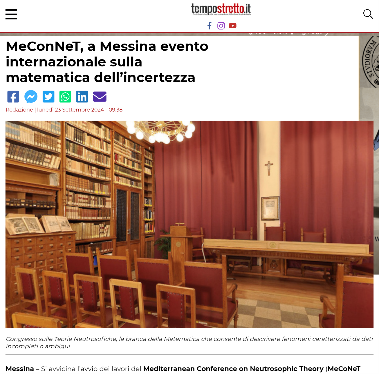
- CalabriaPost:
All set in Messina for MeCoNeT 2024: the international meeting on the mathematics of uncertainty
"Messina is poised to become a focal point of scientific discussions with the arrival of MeCoNeT 2024. The conference will gather international scholars to delve into neutrosophic theory, a growing field that addresses uncertainty and complexity in mathematics."

After the event, media outlets reported on the success of the conference, highlighting the participation of over 100 scholars from around the world. Coverage by PianaInforma and Progetto Touring underlined how MeCoNeT 2024 helped position Messina as a global hub for research in mathematical theories of uncertainty. Articles recounted the depth and diversity of contributions, from keynote speeches to research presentations.
- TempoStretto.it:
MeCoNeT 2024: international event in Messina on the mathematics of uncertainty
"The success of MeCoNeT 2024 has affirmed Messina’s place as a leader in hosting scientific events of global significance. Over 100 scholars, with contributions spanning the latest discoveries in neutrosophic theory, have made this a truly international event."

- PianaInforma:
Successful MeCoNeT 2024 conference: An international event dedicated to the mathematics of uncertainty
"The success of MeCoNeT 2024 marks a turning point for Messina, which has now positioned itself as a center of excellence for research on mathematical uncertainty. This event brought together some of the brightest minds in the field, showcasing the city’s ability to host prestigious international conferences."

- CalabriaPost:
Successful MeCoNeT 2024 conference: An international event dedicated to the mathematics of uncertainty
"The MeCoNeT 2024 conference was a clear success, confirming the increasing global importance of neutrosophic theory. The city of Messina, in particular, has demonstrated its growing relevance in the international scientific community."

- StrettoWeb:
Success for MeCoNeT 2024, the international conference on Neutrosophic Theory held at the University of Messina
"The overwhelming success of the MeCoNeT 2024 conference underscores the growing international recognition of neutrosophic theory. The event saw participation from top global scholars, further strengthening the ties between Messina and cutting-edge scientific research."

- Progetto Touring:
Success for MeCoNeT 2024: An international conference on the mathematics of uncertainty
"MeCoNeT 2024 concluded with widespread acclaim, positioning Messina as a significant player in global academic circles. This conference was a unique opportunity to bring together different perspectives and foster collaboration in the field of mathematical uncertainty."

These articles and quotes demonstrate the extensive media coverage that the MeCoNeT 2024 conference received from prominent local outlets, both before and after the event. This attention not only amplified the conference's impact but also solidified Messina's role as a key hub for international scientific discussions on neutrosophic theory and mathematical uncertainty, reaching both the academic community and the broader public.

Based on the official statistics from the MeCoNeT 2024 website (www.meconet.org), the conference announcement sparked remarkable global interest, resonating strongly within the scientific community. Over the course of just three months, the site attracted visitors from 58 countries across multiple continents, illustrating the far-reaching impact of the event.
This impressive engagement—spanning Asia, Europe, the Americas, and parts of Africa—demonstrates the growing global curiosity around neutrosophic theory and its cutting-edge developments. The international response, as reflected in the data, underscores MeCoNeT 2024’s importance as a pivotal platform for advancing discourse on uncertainty, contradiction, and incomplete information.
The diverse geographic participation highlights the broad scientific appeal of neutrosophic theory across various domains. The hybrid format of the conference further contributed to this wide reach, allowing scholars from around the world to engage both in-person and virtually, ensuring a truly global exchange of ideas.
The MeCoNeT 2024 conference was an overwhelming success, bringing together over 100 scholars from 15 countries and fostering vibrant discussions on the latest developments in neutrosophic theory. The hybrid format, combining in-person sessions at the prestigious Accademia Peloritana dei Pericolanti with parallel online sessions, enabled global participation and collaboration. The diverse range of keynote speeches, research presentations, and interdisciplinary contributions reflected the growing importance of neutrosophic theory in addressing real-world challenges. This event not only solidified Messina's role as a key hub for academic discourse but also underscored the expanding influence of neutrosophic research on a global scale.
We hope that the research presented in this volume will continue to advance the understanding and application of neutrosophic theory and serve as a valuable reference for researchers in this expanding field.
September 2024
Giorgio Nordo
Florentin Smarandache - StrettoWeb:
-
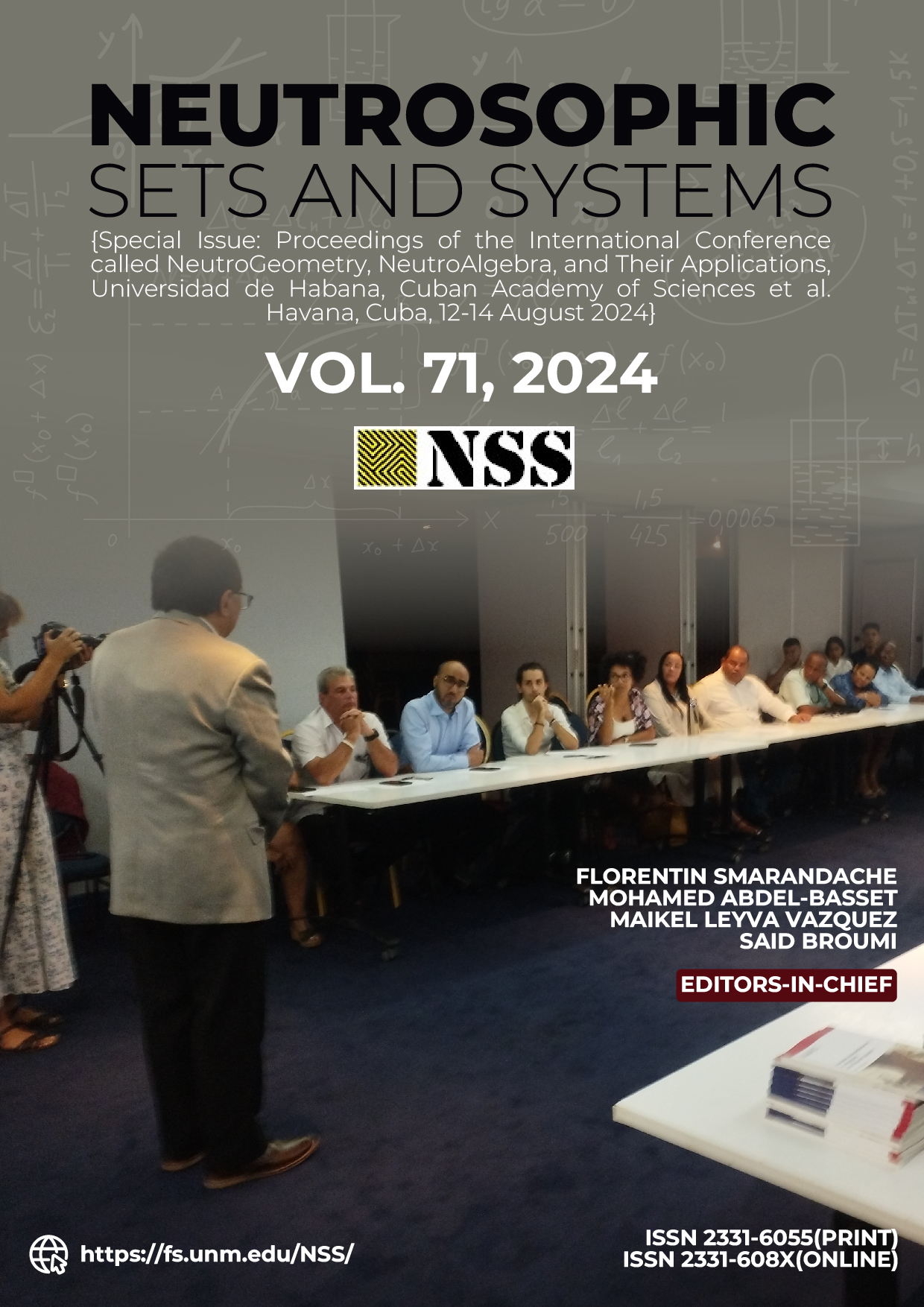
Neutrosophic Sets and Systems {Proceedings of the International Conference called NeutroGeometry, NeutroAlgebra, and Their Applications, Universidad de Habana, Cuban Academy of Sciences et al., Havana, Cuba, 12-14 August 2024}
Vol. 71 (2024)Preface: Proceedings of the International Conference NeutroAlgebra and NeutroGeometry with their Applications, Universidad de Habana, Cuban Academy of Sciences et al., 12-14 August 2024, Cuba
It is an honor to present this special issue of our journal, dedicated to the Conference on NeutroGeometry, NeutroAlgebra, and Their Applications, organized by the Latin American Association of Neutrosophic Sciences. This event, which took place on August 12-14, 2024, in Havana, Cuba, was made possible by the valuable collaboration of the University of Havana, the University of Physical Culture and Sports Sciences "Manuel Fajardo," the José Antonio Echeverría University of Technology, University of Informatics Sciences and the Cuban Academy of Sciences among other institutions.
In 2019 Smarandache generalized the classical Algebraic Structures to NeutroAlgebraic Structures (or NeutroAlgebras) {whose operations and axioms are partially true, partially indeterminate, and partially false} as extensions of Partial Algebra, and to AntiAlgebraic Structures (or AntiAlgebras) {whose operations and axioms are totally false} and on 2020 he continued to develop them ( https://fs.unm.edu/NA/ ).
The NeutroAlgebras & AntiAlgebras are a new field of research, which is inspired from our real world. In classical algebraic structures, all operations are 100% well-defined, and all axioms are 100% true, but in real life, in many cases these restrictions are too harsh, since in our world we have things that only partially verify some operations or some laws.
Similarly, a classical Geometry structure has all axioms totally (100%) true. A NeutroGeometry structure has some axioms that are only partially true, and no axiom is totally (100%) false. Whereas an AntiGeometry structure has at least one axiom that is totally (100%) false ( https://fs.unm.edu/NG/ ).
And in general, in any field of knowledge one has: Structure, NeutroStructure, and AntiStructure ( https://fs.unm.edu/NA/NeutroStructure.pdf ), which were inspired from our real world where the laws (axioms) do not equally apply to all people and in the same degree.
This special issue aims to highlight the most recent advances and applications in the fields of NeutroGeometry and NeutroAlgebra, two areas that are at the forefront of contemporary mathematical and scientific thought. During the conference, the mathematical foundations and practical applications of these disciplines were explored, as well as their relevance in the MultiAlism system and other interdisciplinary areas. The following topics, among others, were covered during the conference:
- Mathematical foundations of NeutroGeometry.
- Mathematical foundations of NeutroAlgebra.
- Applications of NeutroGeometry.
- Applications of NeutroAlgebra.
- Interdisciplinary applications.
- Neutrosophic sets and their generalizations.
- MultiAlism System of Thought.
- Neutrosophic Set-Theoretic Methods of Research.
- NeutroStructure and AntiStructure.
The content of this special issue has been carefully selected to reflect the diversity and depth of the topics discussed at the conference. This event and the subsequent publication of these works underline the growing importance of neutrosophic theories in the current scientific landscape. We are confident that the ideas and discoveries shared in these pages will be of great value to researchers, academics, and professionals interested in these innovative areas of knowledge.
We would like to express our gratitude to all the participants of the conference, as well as to the authors who have contributed their research to this special issue. We hope that readers will find in these pages not only valuable knowledge but also inspiration for future research and applications in the field of neutrosophic sciences.
. Conference Organizers:
- Prof. Dr. Florentin Smarandache, PhD, Postdoc, Mathematics Department, University of New Mexico, Gallup, NM 87301, USA
- Maikel Leyva Vazquez, PhD Universidad de Guayaquil, Guayas, Ecuador
- Pedro Piñero Pérez, PhD, IADES, Cuba
- Jesús Estupiñán Ricardo,PhD, Instituto Superior Tecnológico de Investigación Científica e Innovación, Ecuador
- Iliana Pérez Pupo, PhD, IADES, Cuba
- Erick González Caballero, PhD, José Antonio Echeverría University of Technology
- Omar Mar Cornelio, PhD, University of Informatics Sciences, Cuba
- Salah Hasan Saleh, Qatar Embassy Havana, Cuba
- Bárbara Bron Fonseca, PhD, University of Informatics Sciences, Cuba
- Darvin Manuel Ramírez Guerra PhD, Universidad César Vallejo, Lima, Perú
- PhD, Maura de la Caridad Salabarría Roig, PhD, Center for Studies on Educational Quality and Scientific Research, Toluca, Mexico
- José Sergio Puig Espinosa PhD, Center for Studies on Educational Quality and Scientific Research, Toluca, Mexico
- Oscar José Alejo Machado, PhD, Instituto Superior Tecnológico de Investigación Científica e Innovación, Ecuador
- Karina Pérez-Teruel, PhD, Barna Management School, Santo Domingo, Dominican Republic
- Ricardo Sánchez Casanova, PhD, University of Havana, Cuba
- Ariel Romero Fernández, PhD, Universidad Regional Autónoma de los Andes, Ecuador
- Ángel Martínez Vásquez, MSc, Center for Training and Knowledge Management. Ecuador.
- Jean Pierre Ramos-Carpio, MSc, Center for Studies on Educational Quality and Scientific Research, Toluca, Mexico.
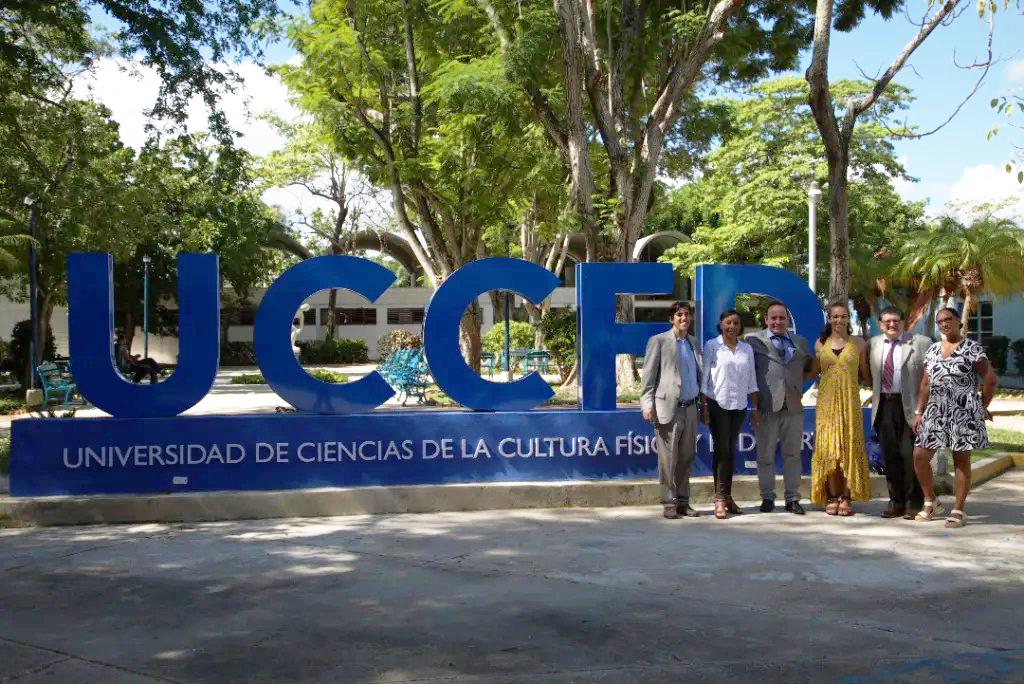
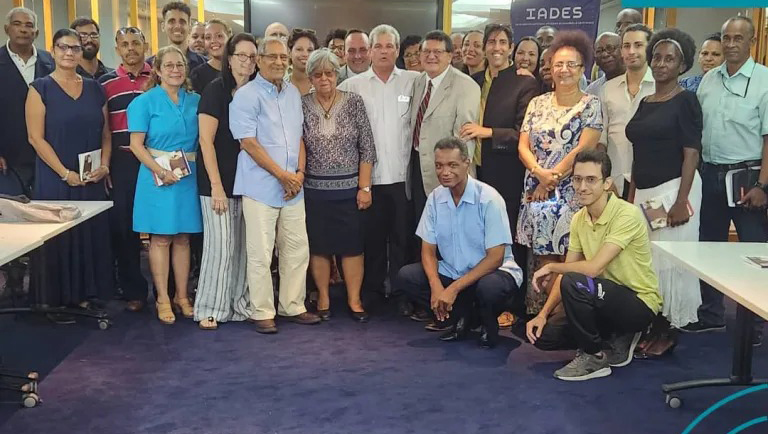




-
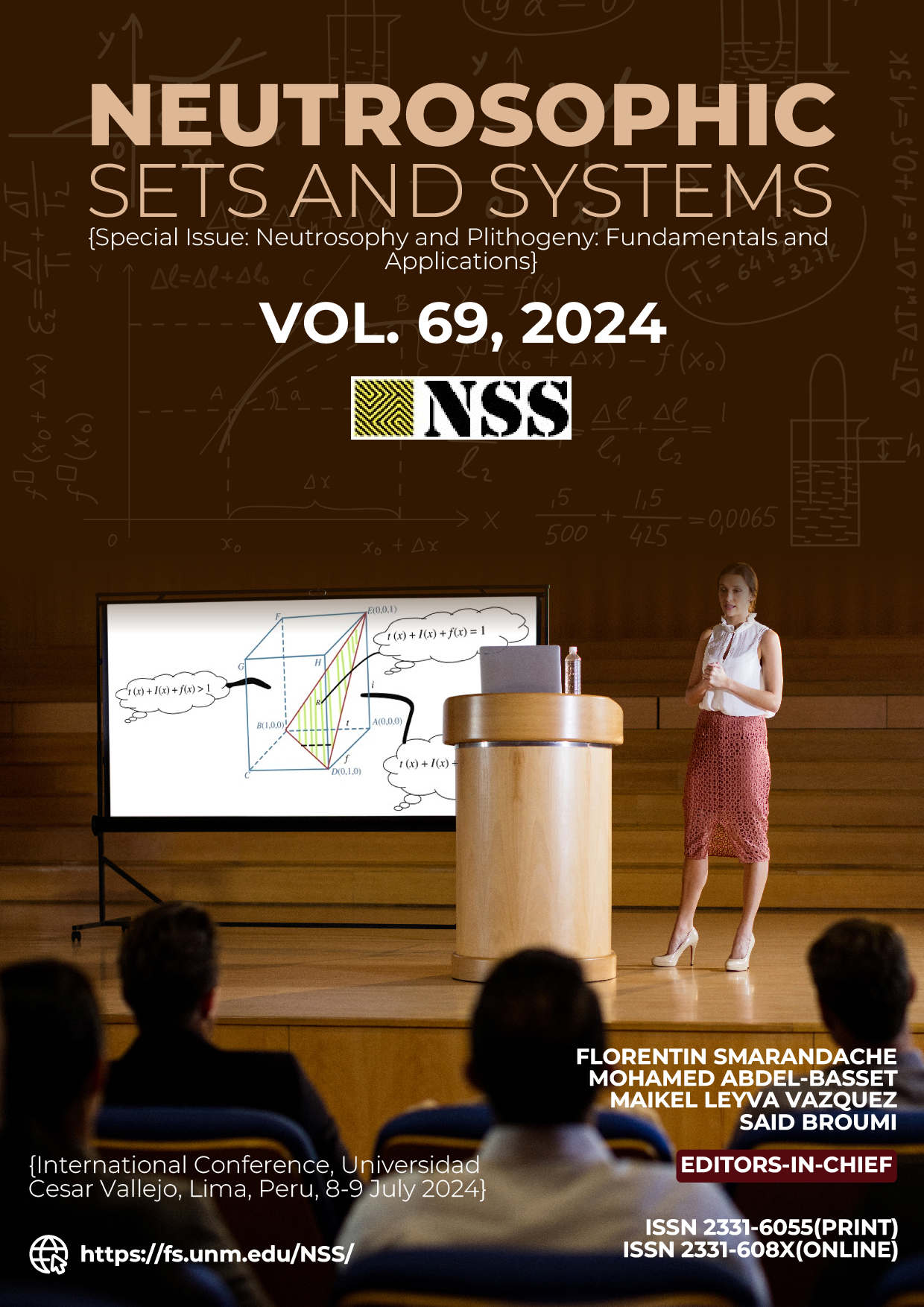
Neutrosophic Sets and Systems {Special Issue: Neutrosophy and Plithogeny: Fundamentals and Applications}
Vol. 69 (2024)PREFACE
We are pleased to present this special issue dedicated to the Neutrosophic approaches in research, on the occasion of the international and multidisciplinary conference Neutrosophy and Plithogeny: Fundamentals and Applications (Spanish) held at the Universidad César Vallejo in Lima, Peru, on July 8 and 9. This event marks a significant milestone, as it is the first time that the Andean region and Latin America host scholars and researchers dedicated to studying various theoretical and applicative issues in the expansive and diverse field of Neutrosophic approaches.
Since its conception, Neutrosophic theory has proven to be an interdisciplinary and innovative field, notably growing with the introduction of several generalizations of Neutrosophic Sets, such as Plithogenic Sets, Hypersoft Sets, IndetermSoft Sets, SuperHyperSoft Sets, and MultiAlism. These advanced conceptualizations have further expanded the versatility and application range of Neutrosophic theory, allowing its adoption in an ever-increasing spectrum of disciplines.
The conference, with its international and multidisciplinary character, has brought together experts and scholars from various fields, providing a unique platform for the discussion and exchange of ideas on the multiple applications of Neutrosophic approaches. The topics covered in this event include, but are not limited to:
- Neutrosophic Approaches in various disciplines, including:
- Computer Science
- Biological Sciences
- Social Sciences
- Engineering
- Art
- Philosophy
- Neutrosophic Sets and their generalizations, such as:
- Plithogenic Sets
- Hypersoft Sets
- IndetermSoft Sets
- TreeSoft Sets
- MultiAlism System of Thought
This special issue also addresses how scientific production in Neutrosophy focuses on social issues specific to Latin American philosophy. In the regional context of Latin America, it is possible to state that Neutrosophic tools and knowledge are used for the identification, analysis, and resolution of social problems, offering unique approaches or distinctive contributions to the field of Neutrosophy, influenced by its cultural and philosophical context.
Neutrosophic science in Latin America shows a clear pattern of how scientific production addresses social problems, standing out for its innovative approaches that reflect the cultural and philosophical particularities of the region. This approach has allowed Neutrosophy not only to advance in theoretical terms but also to provide practical and contextually relevant solutions to social challenges.
This special issue compiles works presented at the conference, reflecting the richness and diversity of current research in this field. We hope that these articles not only contribute to the advancement of knowledge in Neutrosophic theory but also inspire new research and applications in multiple disciplines.
We thank all participants and collaborators for their valuable contributions and hope that this special issue serves as an important reference for future studies in this fascinating and constantly evolving field of research.
Conference Organizers:
- Prof. Dr. Florentin Smarandache, PhD, Postdoc, Mathematics Department, University of New Mexico, Gallup, NM 87301, USA
- Dr. Maikel Leyva Vazquez, Universidad de Guayaquil, Guayas, Ecuador
- Dr. Jesús Estupiñán Ricardo, Instituto Superior Tecnológico de Investigación Científica e Innovación, Ecuador
- Darvin Manuel Ramírez Guerra, Doctor in Physical Culture Sciences, Universidad César Vallejo, Lima, Peru
- MSc. Ernesto Despaigne Paumier, Universidad César Vallejo, Lima, Peru
- PhD, Dante Manuel Macazana Fernández, Universidad Nacional Mayor de San Marcos, Lima, Peru
- PhD, Maura de la Caridad Salabarría Roig, Center for Studies on Educational Quality and Scientific Research, Toluca, Mexico
- PhD, José Sergio Puig Espinosa, Center for Studies on Educational Quality and Scientific Research, Toluca, Mexico
- PhD, Oscar José Alejo Machado, Dean of the Systems Program at the Bolivarian Institute of Guayaquil
- PhD, Dionisio Vitalio Ponce Ruiz, Universidad Regional Autónoma de Los Andes
- PhD, Karina Pérez-Teruel, Open University for Adults (UAPA), Santiago de los Caballeros, Dominican Republic
- PhD, Ricardo Sánchez Casanova, University of Havana, Cuba
- PhD, Ariel Romero Fernández, Universidad Regional Autónoma de los Andes
- MSc. Ángel Martínez Vásquez, Latin American Association of Neutrosophic Sciences
- MSc. Jean Ramos C., Latin American Association of Neutrosophic Sciences.




- Neutrosophic Approaches in various disciplines, including:
